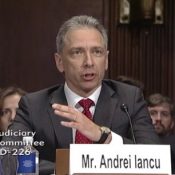

THE USPTO isn't coping with demand for patent quality. Instead it's trying to cope with demand for patents; the more, the merrier?
"It obviously doesn't help that its new Director comes from the litigation 'industry'."We don't suppose patent lawyers like Techrights and we're fine with that. We don't try to collectively or personally insult them, we just make our observations based on the premise that patents were created (came into existence centuries ago) for the purpose of science, not just the purpose of litigation. Some patent lawyers are honest people -- sometimes honest enough to the point of abandoning the occupation. Some people go the other way. Our general advice to patent lawyers, especially in the current climate, is get a real job, people, create something rather than "facilitate litigation" with threatening letters and legal attacks that are costly to both sides (those who actually create things). World Intellectual Property Review published the following some days ago:
Baltzer’s practice focuses on patent litigation in the fields of biotechnology, electronics, and data processing systems.
"So he moved from actually creating software to litigating over software. What a failure."Unfortunately, many people out there think that this is acceptable. They're being brainwashed. Here we have "Recent U.S. Court Decisions and Developments Affecting Licensing" by John Paul and D. Brian Kacedon. Patent maximalists from Finnegan, Henderson, Farabow, Garrett & Dunner LLP are writing 'scholarly' papers by which to push their agenda, which is financial (lawsuits). So even journals, not just the media, get taken over by the litigation 'industry'. Over at Washington Law Review, which one might expect to target lawyers, another evidence of such a thing emerges. “Legislators and industry leaders claim that patent strength in the United States has declined,” they claim, but this is nonsense! Those ‘industry’ ‘leaders’ are law firms that want more lawsuits!
Guess who wrote this paper; it's law firms pushing 'scholarly' papers loaded with lies. It's Steven Udick (Skiermont Derby LLP) helped by Gregory Day (University of Georgia - C. Herman and Mary Virginia Terry College of Business). They suggest "Offshoring Patent Law" in their title! As in sending it to Iancu or law firms' interests? Letting the executive become legislator too? From the abstract:
Legislators and industry leaders claim that patent strength in the United States has declined, causing firms to innovate in foreign countries. However, scholarship has largely dismissed the theory that foreign patents have any effect on where firms invent, considering that patent law is bound by strict territorial limitations (as a result, one cannot strengthen their patent protection by innovating abroad). In essence, then, industry leaders are deeply divided from scholarship about whether innovative firms seek out jurisdictions offering stronger patent rights, affecting the rate of innovation.
The U.S. Patent and Trademark Office will be offering the next webinar in its Patent Quality Chat webinar series from 12:00 to 1:00 pm (ET) on October 9, 2018.